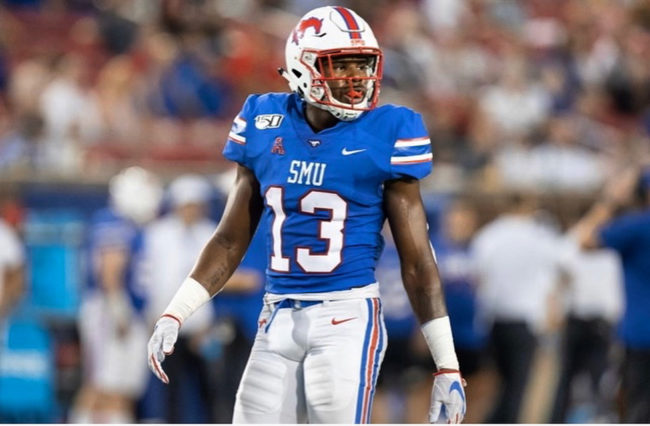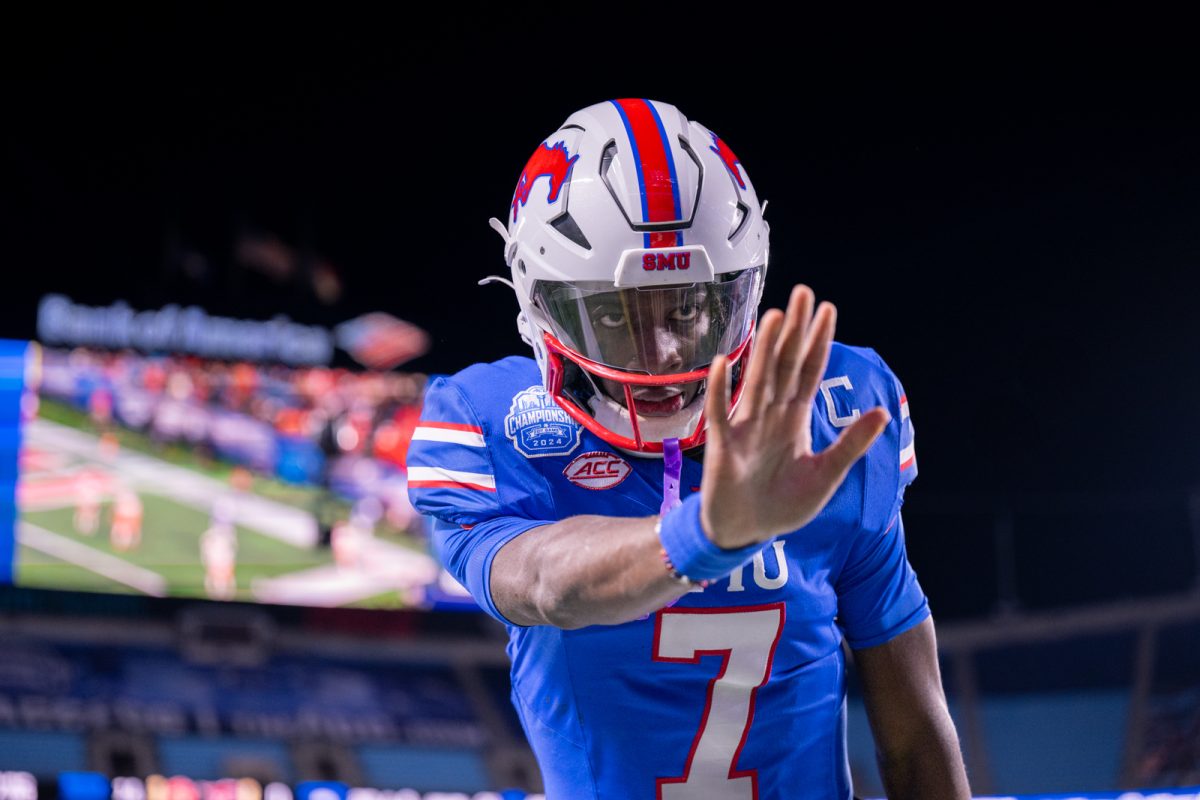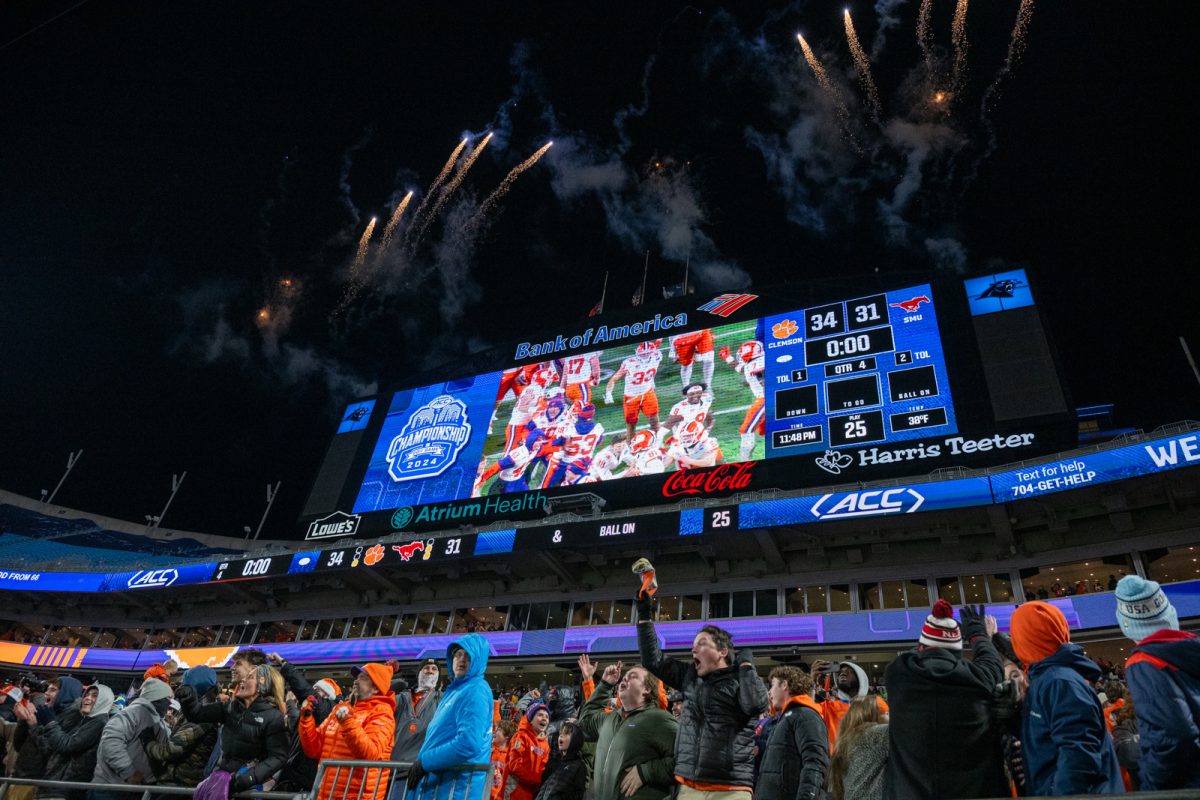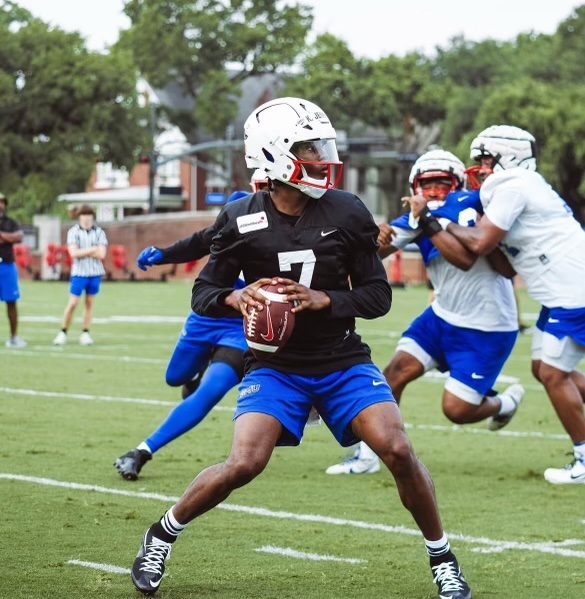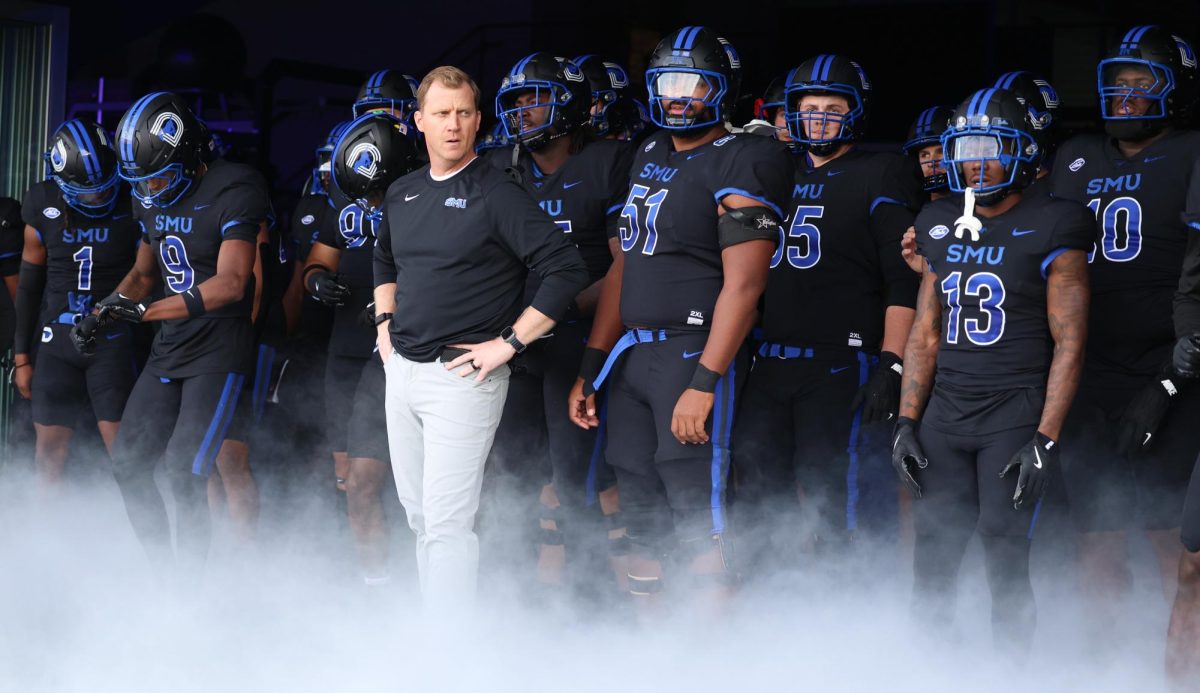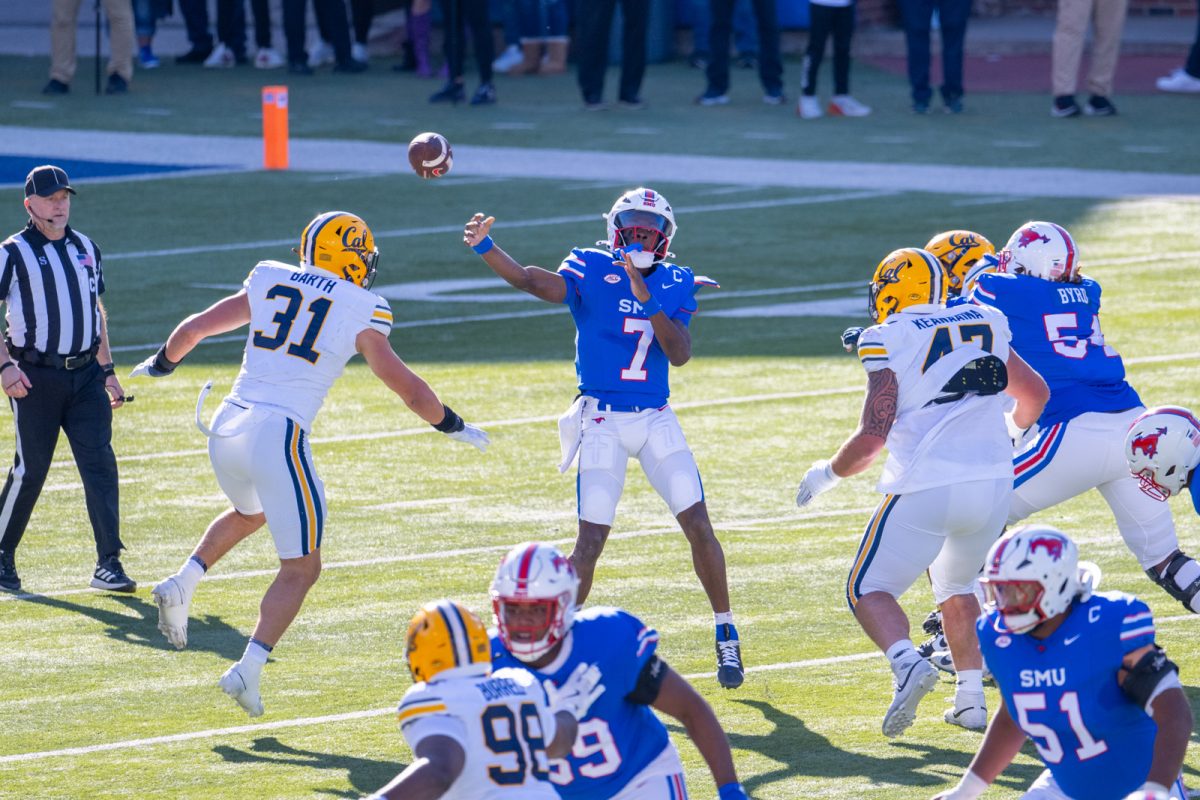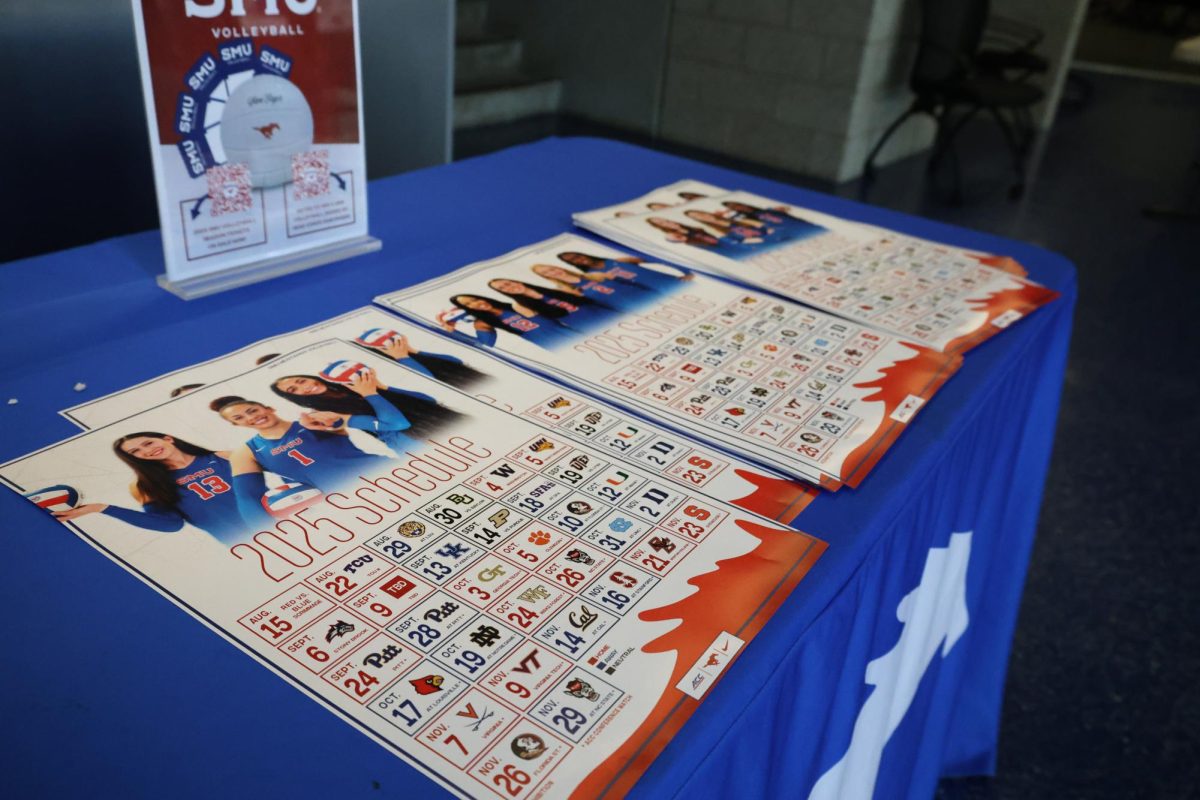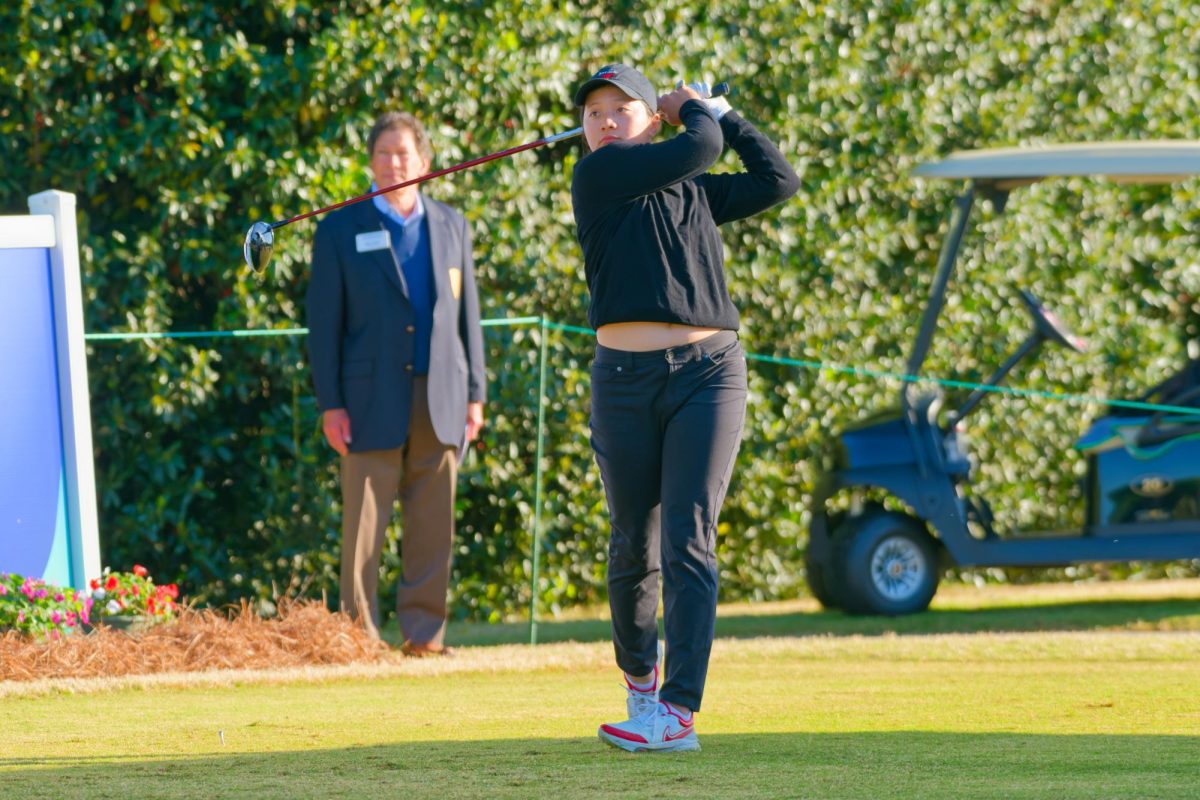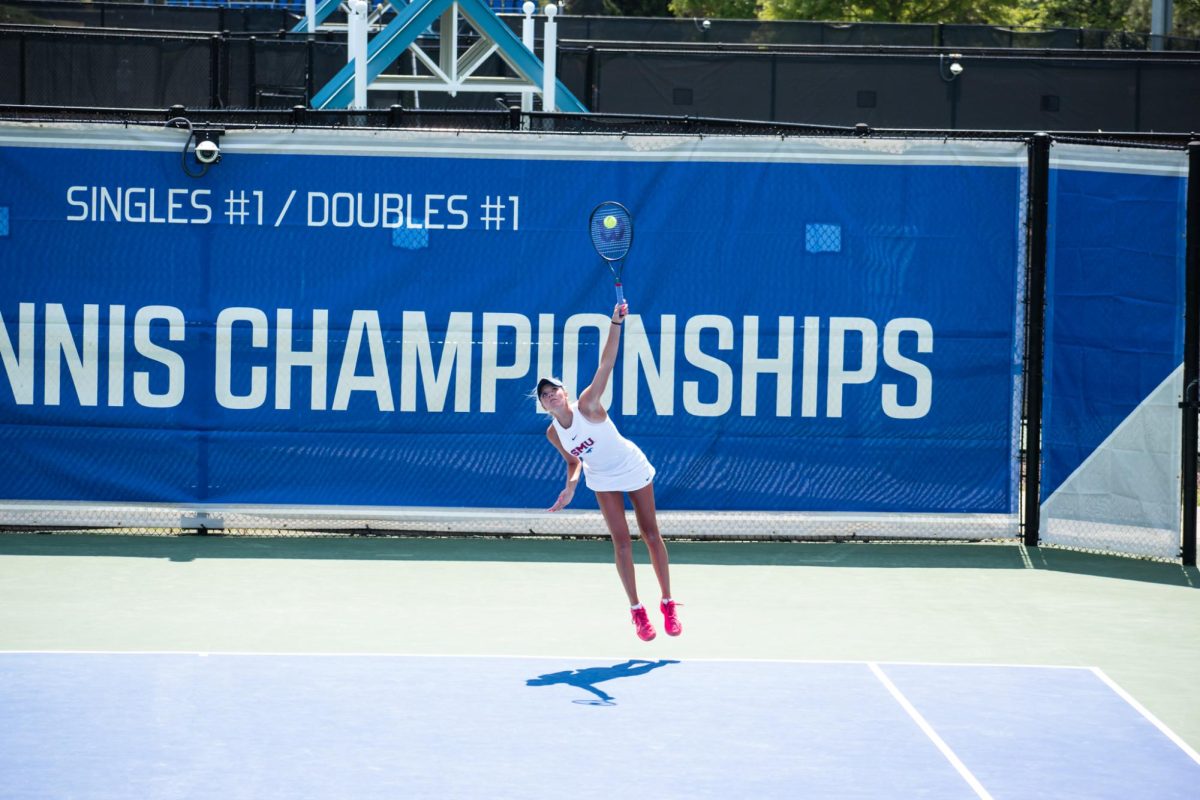On the third floor of Gerald Ford Stadium, Judah Bell peered out onto the field from an empty suite. James Proche and Dez Bryant were working out at the 30-yard-line, barely visible against the natural light that gleaned into the dimly lit corner room. Bell was doing his best to multitask, keeping one eye on a test review and the other on the route tree unfolding before him.
The conversation inside the suite loosely centered on the fate of March Madness (that would be canceled later that day). Bell, who played basketball when he was younger, took a stake in the debate. He shook his head in sympathy when one person asked how they would get through midterms without the study refuge.
Through the cracked open window, the faint yelling of Proche interrupted the discussion as the boisterous receiver playfully took an out-route 70 yards to the end zone in front of an empty stadium.
That was when the conversation wound its way back to spring practice, football and Bell’s reality for the last eight months. Rehabbing a fractured kneecap that forced the sophomore to miss nine games in the 2019 campaign was the day-to-day that Bell couldn’t escape or explain. He fell back on football clichés to deal with the process. He cited things like investing in his teammates and understanding the lessons in sports.
He spoke those phrases like a veteran of the training room. He clung to them like he had been there before and knew exactly where the recovery process would take him. Neither was true. This was the first major injury he had sustained, and he had no real clue what role he would come back to when he was cleared. His coaches saw him transitioning to tight end — a position he had never played in college. Nothing about the process was certain.
The Injury
The day Bell’s season came to an abrupt halt was supposed to be the best of his SMU career. To him, it is still the best day of football he has ever experienced.
A Tyler, Texas native, Bell grew up 90 minutes away from SMU’s campus. He had decommitted from Navy in November of his senior season to commit to SMU two months later. He said he wanted to be closer to home, avoid the homesickness. He had endured two SMU coaching staffs and was one of the few players that stayed when his former head coach Chad Morris left for Arkansas.
“He really bought in to what Coach Dykes was doing,” Tight ends coach Josh Martin said.
For all of these reasons, the game against TCU was going to be his most rewarding. SMU’s eventful 41-38 win over its North Texas foe was its first against the Horned Frogs in nearly a decade. It also positioned SMU to be ranked for the first time in nearly 40 years. It was as close to a perfect script as sports allows, validation for Bell’s faith in his school.
“There was a lot of hype around the game. We hadn’t beat TCU in a long time and to see the way we won the game, overcoming adversity, it was amazing. It was one of the best experiences I had in my life,” Bell said.
But Bell spent most of the day on the sidelines. Early in the second quarter, he contested a throw Shane Buechele lofted out of desperation into the end zone. Bell extended with TCU cornerbacks Jeff Gladney and Ar’Darius Washington to try to prevent the inevitable turnover but was pushed from behind. Washington came up with the ball. Bell landed awkwardly on the ground.
To most, the play was inconspicuous. Bell did not need a stretcher, lobbying to stay in the game, but wide receivers coach David Gru said he knew immediately.
“I just told him ‘Judah, we are going to do everything we can to pull this thing out. You have done everything you possibly can.’ There is a lot out of your control in life and football and this is one of them,” Gru said. “I knew that very play it was a bad deal because he is one of the toughest kids we have. Just by looking at his face and his reaction.”
Bell spent halftime on the training table icing his knee and negotiating with the training staff to no avail. Ultimately, the decision was made for him. His task for the rest of the day was be a teammate, which he did by shouting advice to anyone that would listen or throwing water at players feeling dehydrated. He said the team needed it as it saw a double-digit lead dwindle down to a field goal advantage in the final minutes.
Bell still celebrated with the Iron Skillet like he had played the whole game. He danced with the team in the locker room and posed for pictures — even pretending to cook on the glorified pan. It was still his day, his program’s day, no matter what had happened.
The Next Seven Days
Bell spent the evening of Sept. 21, 2019 with his family. The win against TCU was just as much a triumph for them as it was for Bell — a testament to their belief in the program before it was popular. When he woke up the next morning there was no swelling in his knee, but something was wrong.
“I was in a lot of pain. It was really difficult for me to walk. We were thinking it was a bad patella bruise because it looked fine from the outside,” Bell said.
Bell was a non-participant in practice leading up to the game against South Florida the following Saturday. The coaches allowed him to travel to Tampa with the team, but he did not even bring his pads. In the team hotel, Bell could feel his knee progressively getting worse. That was confirmed when he tried running on an anti-gravity machine at 70% body weight that Sunday and he couldn’t do it.
“It was extremely painful and difficult. That was when we decided we needed an MRI,” Bell said.
Standing at practice the next morning, Bell got the news his season was over. He walked over to the Lloyd Center after collecting his thoughts and sat down with head coach Sonny Dykes and some of the other staff. It was less about informing them of the news, as they already knew, but more about words of encouragement.

By Thursday, his season officially ended when he sat in a hospital bed with his mother, Gru and Gru’s wife, Rachel. Dykes and multiple players came into the room after the surgery finished.
“His state of mind in that situation was really impressive for a guy his age. He has been through a lot with coaching changes, uncertainty of where he is playing and his exact role,” Gru said. “Just his presence and maturity stand out. It really hit me when he was on that hospital bed. He was just smiling and joking around.”
The Year
Of all the years to miss, 2019 was one of the hardest seasons to do so. SMU ranked as high as No. 17 in the country for the first time since 1987. The program won its first eight games and earned an appearance on College GameDay, the sport’s largest regular season showcase. The end result was a double-digit win season and a Boca Raton Bowl bid.
For Bell, he originally did not know how to enjoy the moment without playing. After surgery, he debated whether to go to games. The practical reason was the pain threshold to actually maneuver himself from his apartment and take the 15-minute drive to the stadium. He lived alone at the time and right before the surgery his car went into the shop. Perhaps the bigger reason why it was such a struggle, though, were the emotions of seeing his team play without him.
Two days after surgery, however, he decided to drag himself out of bed and make it to the stadium for SMU’s game against Tulsa. He was unsure what to expect. He spent most of the evening in the training room watching the events from a small screen and hearing the roar of the stadium come through the walls. As the game creeped into overtime — a “thriller movie” as Bell calls the triple overtime 43-37 SMU win — he said he had to sit in the tunnel and watch.
“I didn’t want to be in the way. I couldn’t move very fast as everyone was going nuts,” Bell said of watching the students storm the field. “I was hesitant at first. I didn’t want people always asking if I needed something. Like ‘I am in pain over here.’ But that was a selfish thought of mine. It is not about what people are going to think about me.”
Game days slowly began to settle into a routine for the sophomore wide receiver as his mobility improved. It still felt awkward at times, but he coped by putting on his jersey and talking with other injured players like redshirt freshman Cam’ron Jones and sophomore Harrison Loveless. He said it was the, “medicine he didn’t know he needed.”
Practices were the hardest part of the equation even if Saturday’s were the most visible reminder of his situation. For the first three weeks, he was not even allowed to come to the morning training sessions because standing on his feet for two hours at a time was not possible.
“I know what kind of mental warfare it is when you are hurt. Especially with a guy like him that is so unselfish and wants to do anything he can to help us keep getting better,” Gru said. “I just encouraged him to not fall into the hole. I have been there, and you almost feel useless.”
“I wasn’t doubting what I was doing, but what was going on. I know I have been (working hard), and it didn’t make sense. I had done extra work with everything,” Bell said. “I didn’t doubt, I was just like ‘why is this happening to me.’”
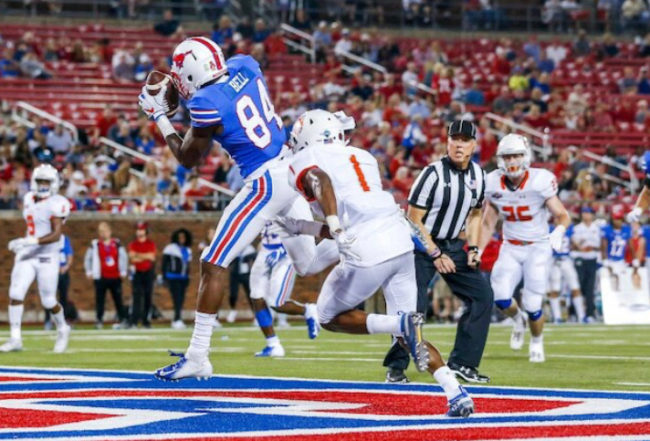
The Road Back
When Bell was able to move around, two more factors made things more difficult for him to swallow. His rehab regiment meant being at the facility by 5 a.m., but he couldn’t drive. Seniors James Proche, Myron Gailliard and Justin Guy took turns picking him up and driving him to campus. Proche would often offer to do laundry. Coaches would do the honors if the players were unable to.
“It was just amazing to see they really meant (it was a family). I mean, they are in the middle of a historical season that SMU hasn’t in decades and nobody would blame you for not daily checking up on a guy that was injured,” Bell said.
The other part that complicated things was the wide receiving corps was thinning out as the season went on. Reggie Roberson Jr., SMU’s second starting receiver, went down with an ankle injury at Houston. In his place, Bell had to watch younger players step up and fill the role that could have been his. Rashee Rice, a true freshman, made two starts down the stretch and caught 25 balls and a touchdown. Bell, though, said that was easier to handle than the early mornings.
“It was only hard in the sense that I couldn’t be out there doing what I loved to do. That was still the most fun year of football I have ever had in my life,” Bell said. “Watching guys, especially Rashee, (was good). We all saw throughout fall camp that his work ethic (and) his raw talent spoke for itself. With him being the young guy, there wasn’t a whole lot I had to tell him in terms of approach.”
A changing role
The process of recovery for Bell, though, doesn’t stop just because the doctors cleared him to play last week. Halfway through the 2019 campaign, Dykes and the offensive coaching staff talked with Bell about different ways they could get him involved in the offense. The wide receiver position was being backlogged as guys like Rice, Tyler Page and redshirt players fought for snaps.
The coaches wanted to transition the 6-foot-3, 215-pound player to more of a tight end position. His frame and size made him an obvious candidate for the role. Martin said he fits perfectly with the mold of current tight end Kylen Granson. Granson used his versatility to take home all-conference honors and caught nine touchdowns for 721 yards durning his first year on the Hilltop.
“I think at the position we use, the Y, you have to be very versatile. All the guys we have right now (are),” Martin said. “Judah can do a lot of things for you because you can utilize him in the slot, backfield, he can be a matchup problem for us… He is a Renaissance man.”
True to form, Bell spends most of his days now talking with Granson about reading coverages, blocking schemes and learning what made the Rice transfer such an anchor of the offense. Martin said those relationships are so important for Bell’s success. Fellow tight end Ben Redding also helps out with the transition.
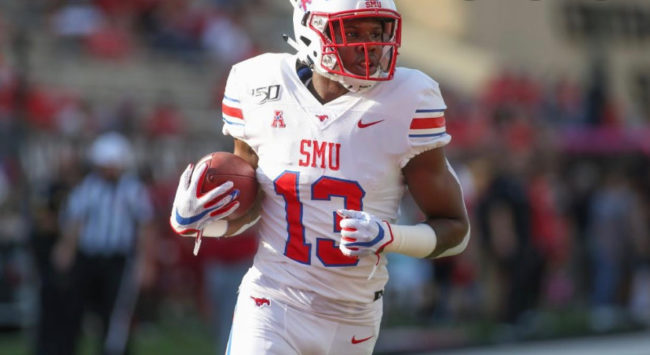
“Kylen carried a really heavy load for us last year… He (was) not coming off the field,” Gru said. “I think we can become even better now with a guy like Judah helping Kylen and Ben. He can give them a break and fill that role. We needed another guy like that and I am excited to see him do it.”
Gru added that he thought part of the reason why Bell was injured was because he played out of position. He said, “I think it suits him better (tight end). He is a heavy guy, a tall guy. He trains so hard and runs so much. A guy with his body can only handle so much of that load.”
Bell said he will hit the ground running whenever he is asked to play. He brings the same approach to his new role as he did when he got injured, even if he still doesn’t know where it will take him.



